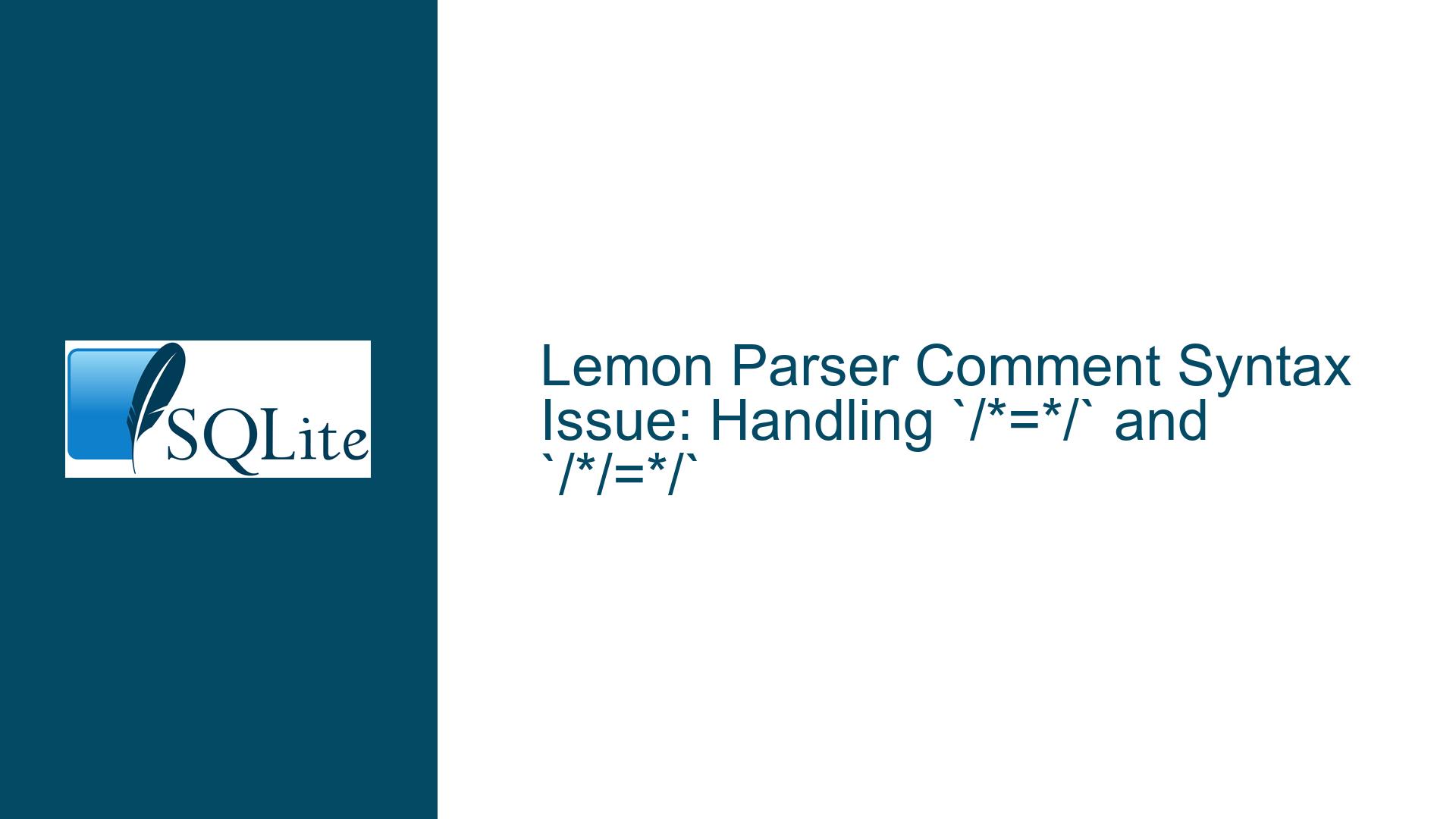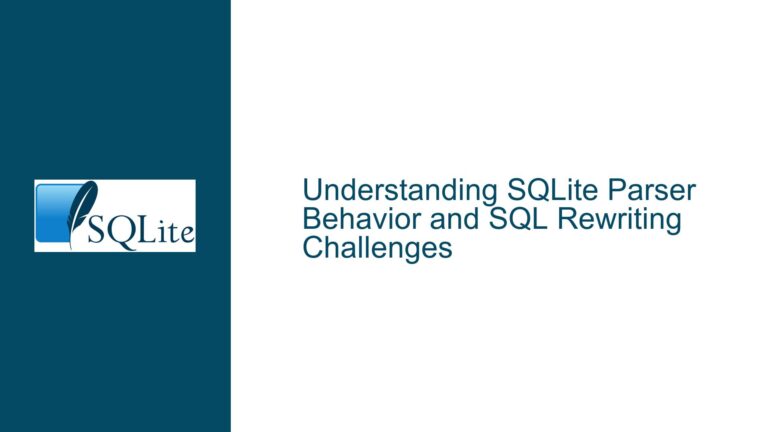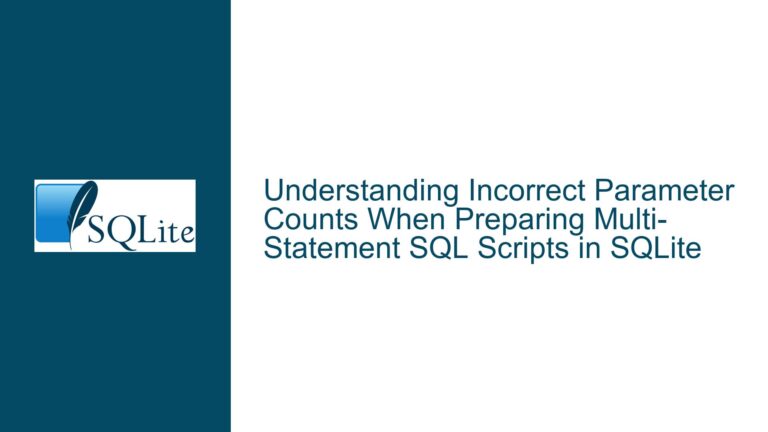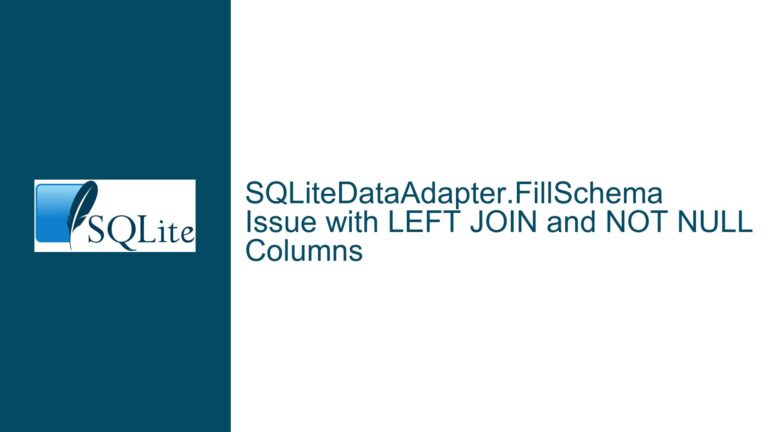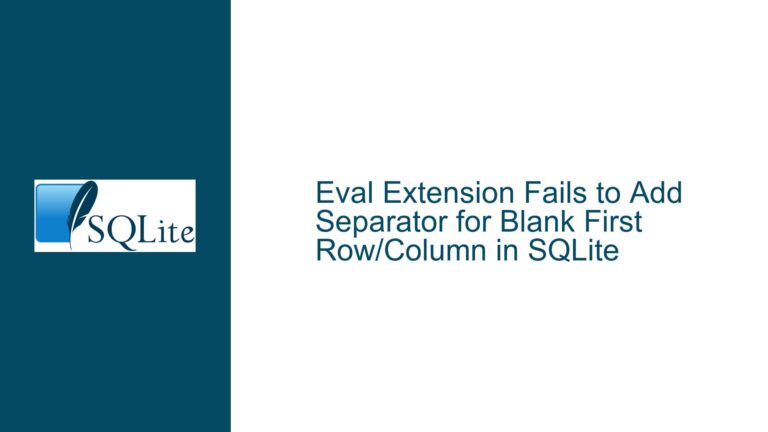Lemon Parser Comment Syntax Issue: Handling `/*=*/` and `/*/=*/`
Issue Overview: Lemon Parser Fails to Parse Comments with Specific Syntax
The Lemon parser generator, a tool widely used for creating parsers in SQLite and other lightweight database systems, exhibits unexpected behavior when encountering specific comment patterns in grammar rules. The issue arises when comments containing the sequences /*=*/ or /*/=*/ are embedded within grammar rules. Lemon either fails to parse the rule entirely or reports a parsing conflict, depending on the exact placement of spaces within the comment.
In the first scenario, the grammar rule prog ::= stmt /*=*/ . causes Lemon to throw an error: Illegal character on RHS of rule: "=". This indicates that Lemon is interpreting the = character within the comment as part of the grammar rule, rather than ignoring it as a comment. This behavior is unexpected because comments are typically treated as whitespace and should not influence the parsing logic.
In the second scenario, the grammar rule prog ::= stmt2 /*/=*/ . produces a different error: This rule can not be reduced. 1 parsing conflicts. This suggests that Lemon is unable to resolve the rule due to the presence of the /*/=*/ comment. Interestingly, adding a space within the comment (/* /=*/) changes the error message but does not resolve the underlying issue. Instead, it introduces a parsing conflict, indicating that Lemon’s internal logic is sensitive to the exact formatting of comments.
This issue is particularly problematic for developers who are converting grammars from other parser generator tools, as these tools may allow comments with arbitrary syntax. The inability of Lemon to handle such comments can lead to significant debugging efforts and require manual adjustments to the grammar rules.
Possible Causes: Lemon’s Comment Handling Logic and Tokenization
The root cause of this issue lies in Lemon’s comment handling logic and its tokenization process. Lemon, like many parser generators, uses a lexer to break the input grammar into tokens, which are then processed by the parser. Comments are typically ignored during this tokenization phase, but Lemon’s implementation appears to have limitations when dealing with comments that contain specific character sequences.
The = character is a special symbol in Lemon’s grammar rules, often used to denote assignments or other operations. When Lemon encounters /*=*/, it may mistakenly interpret the = as part of the grammar rule rather than as part of a comment. This interpretation leads to the Illegal character on RHS of rule: "=" error. The issue is exacerbated by the fact that Lemon does not provide detailed diagnostics for comment-related errors, making it difficult for developers to identify the problem.
Similarly, the /*/=*/ sequence appears to interfere with Lemon’s ability to reduce the grammar rule. The / character is often used in regular expressions and other parsing contexts, and its presence within a comment may confuse Lemon’s tokenizer. The addition of a space (/* /=*/) changes the tokenization process but does not fully resolve the issue, as evidenced by the parsing conflict that arises.
Another possible cause is Lemon’s handling of nested comments or comments that span multiple lines. While the examples provided involve single-line comments, it is possible that Lemon’s comment handling logic is not robust enough to handle all edge cases, especially when comments contain characters that are significant in the grammar rules.
Troubleshooting Steps, Solutions & Fixes: Resolving Comment-Related Parsing Errors
To address the issue of Lemon failing to parse comments with specific syntax, developers can follow a series of troubleshooting steps and apply potential fixes. These steps are designed to help identify the root cause of the problem and implement workarounds that allow the grammar to be parsed correctly.
Step 1: Review the Grammar Rules and Comment Placement
The first step in troubleshooting this issue is to carefully review the grammar rules and the placement of comments. Ensure that comments are not inadvertently placed in positions where they could interfere with the parsing process. In particular, avoid placing comments that contain special characters (such as = or /) immediately adjacent to grammar symbols.
For example, instead of writing:
prog ::= stmt /*=*/ .
Consider adding a space between the comment and the grammar symbol:
prog ::= stmt /* =*/ .
This simple adjustment can often resolve issues related to comment syntax.
Step 2: Modify the Comment Syntax
If the issue persists, consider modifying the comment syntax to avoid using sequences that may confuse Lemon’s tokenizer. For example, replace /*=*/ with a different comment format, such as /* equals */ or /* assignment */. Similarly, replace /*/=*/ with /* slash */ or another descriptive comment.
For example:
prog ::= stmt /* equals */ .
prog ::= stmt2 /* slash */ .
This approach ensures that the comments do not contain characters that could be misinterpreted by Lemon.
Step 3: Use Preprocessor Directives to Remove Problematic Comments
If modifying the comment syntax is not feasible, consider using preprocessor directives to remove problematic comments before passing the grammar to Lemon. Many build systems and development environments support preprocessor tools that can strip out comments or replace them with harmless alternatives.
For example, you could use a simple script to replace /*=*/ with an empty string or a space:
sed 's/\/\*=*\// /g' gram.y > gram_processed.y
Then, pass the processed file (gram_processed.y) to Lemon:
../lemon gram_processed.y
This approach allows you to retain the original comments in your source files while avoiding issues during parsing.
Step 4: Debug Lemon’s Tokenization Process
If the issue remains unresolved, it may be necessary to debug Lemon’s tokenization process to understand how it handles comments. This step requires modifying the Lemon source code to add logging or diagnostic output that reveals how comments are being processed.
For example, you could add logging statements to the Parse function in Lemon’s lempar.c file to print out the tokens being generated:
void Parse() {
// Add logging to debug tokenization
printf("Token: %s\n", yymajor);
// Original Parse logic
}
Recompile Lemon with these modifications and run it on your grammar file. The output will help you identify whether comments are being tokenized correctly or if they are causing unexpected behavior.
Step 5: Submit a Bug Report or Feature Request
If none of the above steps resolve the issue, consider submitting a bug report or feature request to the Lemon maintainers. Provide a detailed description of the problem, including the grammar rules that trigger the issue and any error messages produced by Lemon. If possible, include a minimal reproducible example that demonstrates the problem.
The Lemon maintainers may be able to provide a fix or workaround, or they may incorporate improvements to the comment handling logic in future releases. In the meantime, you can continue to use the workarounds described above to avoid the issue in your projects.
Step 6: Explore Alternative Parser Generators
If the issue with Lemon’s comment handling is a significant obstacle, consider exploring alternative parser generators that may offer more robust comment handling. Tools like Bison, ANTLR, or Yacc may provide more flexibility in this regard, though they may also have their own limitations and learning curves.
When evaluating alternative tools, consider factors such as ease of integration with your existing workflow, performance, and compatibility with your target platform. Keep in mind that switching parser generators may require significant changes to your grammar and parsing logic, so this step should be undertaken only after careful consideration.
Conclusion
The issue of Lemon failing to parse comments with specific syntax is a nuanced problem that requires a combination of careful grammar design, comment modification, and debugging techniques. By following the troubleshooting steps outlined above, developers can identify and resolve the root cause of the issue, ensuring that their grammars are parsed correctly by Lemon. In cases where the issue cannot be resolved, alternative parser generators may provide a viable solution. Regardless of the approach taken, a thorough understanding of Lemon’s comment handling logic and tokenization process is essential for effective troubleshooting and resolution.
